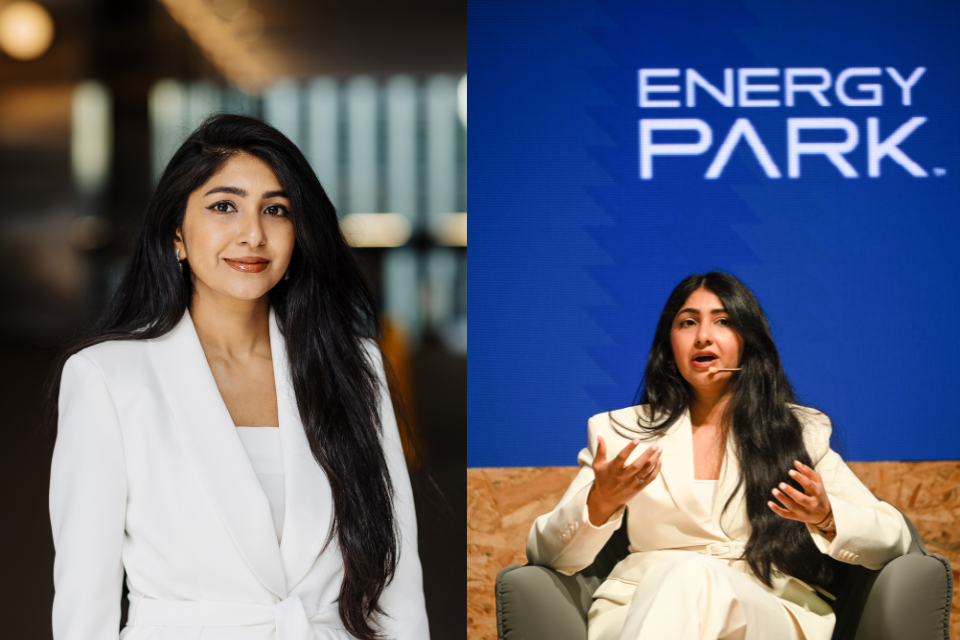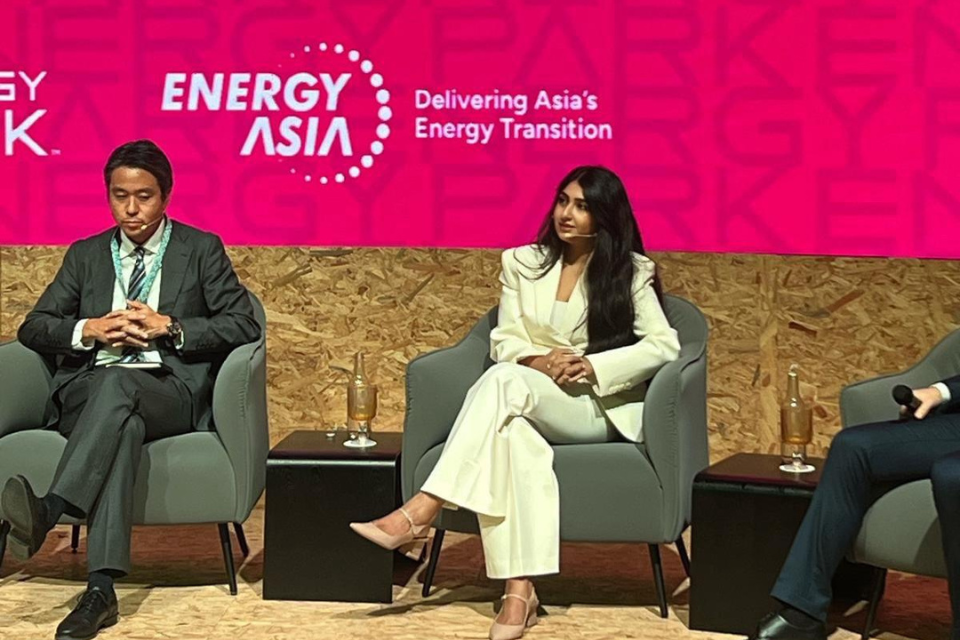Pavina Adunratanasee is the founder and CEO of Recalibrate Climate, an industrial transition partner aligning breakthrough technologies, strategic capital, and industry partners to accelerate decarbonisation and build climate resilience.
Her entrepreneurial instincts trace back to weekends spent at her family's export enterprise in Bangkok. Her grandfather migrated from India in the 1950s to build generational enterprises. Watching him, she absorbed a lasting lesson: that leadership means stewarding not just enterprises, but a mission that equips the next generation to thrive.
Her world view was shaped by 2 poles: her grandfather's hometown of Chidambaram, India, beside the Pichavaram mangroves, and Bangkok, a hub of global trade. This dual lens - resilience from nature and dynamism from industry - drives her conviction that Asia's future depends on bridging heritage and innovation.
'Nature regeneration wasn't a concept, it was part of life,' Pavina says. 'When you grow up with that awareness, you understand what's at stake.'
From climate finance to emerging technologies
After earning her Master's at Columbia University, Pavina began advising clean-energy developers across Asia-Pacific with Siemens Financial Services, financing renewable power projects. A defining moment came as she stood beneath wind turbines in Vietnam:
'I realised clean energy wasn't just about megawatts,' she recalls. 'I saw the blueprint for communities to thrive in a low-carbon future.'
In 2019, Pavina moved to Australia with no local network, betting that the country was entering a decisive clean-energy phase. The Black Summer wildfires and a visit to the Great Barrier Reef brought climate change into stark focus.
'It was no longer an abstract issue from an IPCC report: it was visceral, urgent, and happening now," she says.
Determined to break into the market, Pavina had more than 100 coffees with industry leaders before joining Neoen, where she gained exposure to battery-storage development and energy markets.
Transforming industries with the right financing structures
When COVID reshaped the world, Pavina recognised the powerful convergence of energy and new technology. She channelled her insights into co-founding a vehicle-to-grid startup through Antler's accelerator. The venture failed to achieve customer adoption, but it left her with hard-won wisdom:
'Setbacks, from a startup that couldn't take flight to unexpected career transitions, became my greatest teachers, showing me resilience isn't just surviving,' says Pavina. 'It's choosing to create again, even when the odds are against you. It gave me a deep respect for every founder trying to bring bold technologies to life.'
This experience gave her a front-row view into how utilities operate and navigate risks. She later joined Iberdrola, one of the world's largest renewable-energy companies, to help bring new solutions to market.
That role reinforced her most critical learning: 'Technology alone isn't enough. To transform industries, you also need the right financing structures, policies, and partnerships to carry innovation across the finish line," she notes.

Recalibrate Climate founder Pavina Adunratanasee is aligning demand, breakthrough technologies and strategic capital to help accelerate decarbonisation and build climate resilience.
From breakthrough to bankability
'Many transformative climate solutions don't scale not because they're flawed, but because of misalignment between industrial buyers, financing models, and policy frameworks,' Pavina says.
This realisation led her to launch Recalibrate Climate, a platform built to align demand, breakthrough technologies, and strategic capital into bankable pathways.
'The most transformative climate solutions are often the hardest to finance,' she says. 'They're complex, capital-intensive, take years to scale, and don't fit the risk-return profile of traditional investors. Our role is to design the right pathways so these solutions can scale in the real economy faster and with lasting impact.'
Today, Pavina is eyeing the global stage with Asia at the core of her mission. A proud Australian with deep Asian roots, her work spans innovation and capital hubs worldwide, anchored in scaling solutions for Asia's energy transition.
Asia's clean energy future
Asia-Pacific produces nearly half of global emissions and faces severe climate risks, yet holds immense opportunity.
Thailand, for example, is positioning itself as a hub for electric vehicle manufacturing, opening demand for batteries, recycling, and new mobility solutions. Across Southeast Asia, governments are rolling out carbon markets and new incentives for clean industry.
'Green economy is a growing sector of opportunity across Southeast Asia,' says Amelia Walsh, Austrade's Senior Trade and Investment Commissioner to Thailand and Laos. 'Thai government policies on emissions reduction and sustainable development offer opportunities for Australian capabilities, from EV supply chains to carbon measurement and valorisation.'
'Technology is advancing at unprecedented speed, and open-source innovation means solutions can diffuse globally faster than ever before,' Pavina adds. 'Asia has a rare window to leapfrog legacy infrastructure and lead the world in industrial transformation.'
With trillions in investment needed and costs falling, Pavina believes the next 5 years are critical. 'If we align policy, capital, and technology now, we can build industries fit for a low-carbon economy faster, bolder, and with more resilience than markets weighed down by outdated systems.'

Pavina speaking at Energy Asia in Kuala Lumpur. She says Asia has a rare window to lead the world in industrial transformation.
The Industrial Transition Blueprint
Pavina calls her vision the "Industrial Transition Blueprint", a framework to retool Asia's industrial base for the century ahead.
Automation, AI, circular production, and electrification will rewire supply chains, factories, and transport systems into adaptive, efficient, climate-positive models.
'Solving climate challenges isn't just about deploying the next big technology,' she says. 'It requires enabling policies, smart capital, trusted local partnerships, and a long-term commitment to deliver impact that lasts.'
AI, she adds, is collapsing timelines. 'Decarbonisation is no longer a 2050 conversation: it's about how quickly we can rewire industries now.'
Asia's defining decade
'Capital markets were built for a stable climate. At 3 degrees, there is no portfolio diversification strategy that works,' Pavina warns. 'The only real hedge is accelerating the transition now and ensuring it's built to last.'
Her vision is to retool the region's industrial base for the century ahead and build lasting resilience.
'The winners of this decade will be those who can mobilise capital at speed, deploy breakthrough technologies at scale, and forge alliances across borders,' she says.
Pavina is betting on Asia to lead the global transition, transforming it from a manufacturing base into the epicentre of the climate economy.






